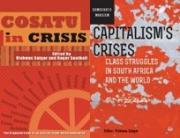
A double book launch was held for Vishwas Satgar's "Capitalism's Crises: Class Struggles in South Africa and the World" (Wits University Press, 2015) and "COSATU in Crisis: The Fragmentation of an African Trade Union Federation" (KMM Review Publishing, 2015, co-edited with Roger Southall) on 18 May 2016 as part of the Labour Studies Seminar, which run by Neil Aggett Labour Studies Unit (NALSU) and the Departments of Sociology, History, and Economics and Economic History.
Prof Satgar is a member of the Department of International Relations at the University of the Witwatersrand. He is editor of the "Democratic Marxism" book series, which recently won an Outstanding Contribution award from the World Association of Political Economy. An activist for over three decades, he served in the Black Students Society at the University of Natal, the Natal Indian Congress, the United Democratic Front, the African National Congress, and the South African Communist Party (SACP). He also worked at COSATU's think tank NALEDI. In 2009, he was expelled from the SACP for his views, and is currently involved in supporting left convergence and grassroots movement-building.
Prof Satgar pointed out that the global slump of 2015/2016 cost South Africa hundreds of thousands more: 120,000 in February 2016 alone. Over three decades of capitalist restructuring have produced a global capitalism in which finance is structurally central and drives permanent instability. So-called "emerging markets" in the Global South are also showing signs of deceleration and are clearly not the expected engines to drive global growth. Poverty and inequality are surging, not falling. How can capitalism's ongoing crisis be understood? What can be done, and are we doing it? These two ground-breaking edited books go to the heart of these questions. "Capitalism's Crises" reflects on a wide-range of left responses, from Occupy Wall Street, to the People’s Budget Initiative in India, to labour unions and left parties such as Syriza and Podemos in Europe. Bringing together cutting edge radical research, much of it by African activists and scholars, the contributors to the volume ask: Is the global crisis of capitalism simply that of financialised chaos, or multiple, interlinked and historically unprecedented crises? And is this a moment to be met with despair or with transformative agency?
"COSATU in Crisis" examines issues ranging from the experiences of unions in post-independence Africa, to growing inequality, to the changing membership and traditions of COSATU, to strike violence and the future of the ANC-led Alliance. What role can organised workers play in the transition from this mess? What has happened to the labour-led working class projects of Soviet Union-style socialism, social-democracy and revolutionary nationalism? South Africa's labour movement, centred on COSATU, has embodied all three, but is unravelling. Why? What lessons can be learned from COSATU's strategic engagements for the way forward? Is there a new strategy for labour capable of addressing the systemic crises of contemporary capitalism?
Prof Robert van Niekerk of the Institute of Social Economic Research at Rhodes University and Mr Kanyiso Ntikinca, a PhD candidate in the Department of Sociology, acted as discussants.
